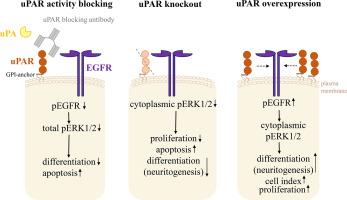Cellular Signalling ( IF 4.4 ) Pub Date : 2020-08-18 , DOI: 10.1016/j.cellsig.2020.109741 K D Rysenkova 1 , P S Klimovich 2 , A A Shmakova 2 , M N Karagyaur 3 , K A Ivanova 4 , N A Aleksandrushkina 5 , V A Tkachuk 1 , K A Rubina 6 , E V Semina 1

|
Urokinase-type plasminogen activator uPA and its receptor (uPAR) are the central players in extracellular matrix proteolysis, which facilitates cancer invasion and metastasis. EGFR is one of the important components of uPAR interactome. uPAR/EGFR interaction controls signaling pathways that regulate cell survival, proliferation and migration. We have previously established that uPA binding to uPAR stimulates neurite elongation in neuroblastoma cells, while blocking uPA/uPAR interaction induces neurite branching and new neurite formation. Here we demonstrate that blocking the uPA binding to uPAR with anti-uPAR antibody decreases the level of pEGFR and its downstream pERK1/2, but does increase phosphorylation of Akt, p38 and c-Src Since long-term uPAR blocking results in a severe DNA damage, accompanied by PARP-1 proteolysis and Neuro2a cell death, we surmise that Akt, p38 and c-Src activation transmits a pro-apoptotic signal, rather than a survival.
Serum deprivation resulting in enhanced neuritogenesis is accompanied by an upregulated uPAR mRNA expression, while EGFR mRNA remains unchanged. EGFR activation by EGF stimulates neurite growth only in uPAR-overexpressing cells but not in control or uPAR-deficient cells. In addition, AG1478-mediated inhibition of EGFR activity impedes neurite growth in control and uPAR-deficient cells, but not in uPAR-overexpressing cells. Altogether these data implicate uPAR as an important regulator of EGFR and ERK1/2 signaling, representing a novel mechanism which implicates urokinase system in neuroblastoma cell survival and differentiation.
中文翻译:

尿激酶受体缺陷导致 EGFR 介导的小鼠神经母细胞瘤细胞存活和神经突形成信号的传递失败。
尿激酶型纤溶酶原激活剂 uPA 及其受体 (uPAR) 是细胞外基质蛋白水解的核心参与者,可促进癌症侵袭和转移。EGFR是uPAR相互作用组的重要组成部分之一。uPAR/EGFR 相互作用控制调节细胞存活、增殖和迁移的信号通路。我们之前已经确定,uPA 与 uPAR 结合会刺激神经母细胞瘤细胞中的神经突伸长,而阻断 uPA/uPAR 相互作用会诱导神经突分支和新的神经突形成。在这里,我们证明用抗 uPAR 抗体阻断 uPA 与 uPAR 的结合会降低 pEGFR 及其下游 pERK1/2 的水平,但确实会增加 Akt、p38 和 c-Src 的磷酸化,因为长期 uPAR 阻断会导致严重的 DNA损伤,伴随着 PARP-1 蛋白水解和 Neuro2a 细胞死亡,
导致神经发生增强的血清剥夺伴随着 uPAR mRNA 表达上调,而 EGFR mRNA 保持不变。EGF 对 EGFR 的激活仅刺激 uPAR 过表达细胞中的神经突生长,而不会刺激对照或 uPAR 缺陷细胞中的神经突生长。此外,AG1478 介导的 EGFR 活性抑制会阻碍对照细胞和 uPAR 缺陷细胞中的神经突生长,但不会阻碍 uPAR 过表达细胞。总而言之,这些数据表明 uPAR 是 EGFR 和 ERK1/2 信号传导的重要调节剂,代表了一种新机制,该机制涉及神经母细胞瘤细胞存活和分化中的尿激酶系统。











































 京公网安备 11010802027423号
京公网安备 11010802027423号